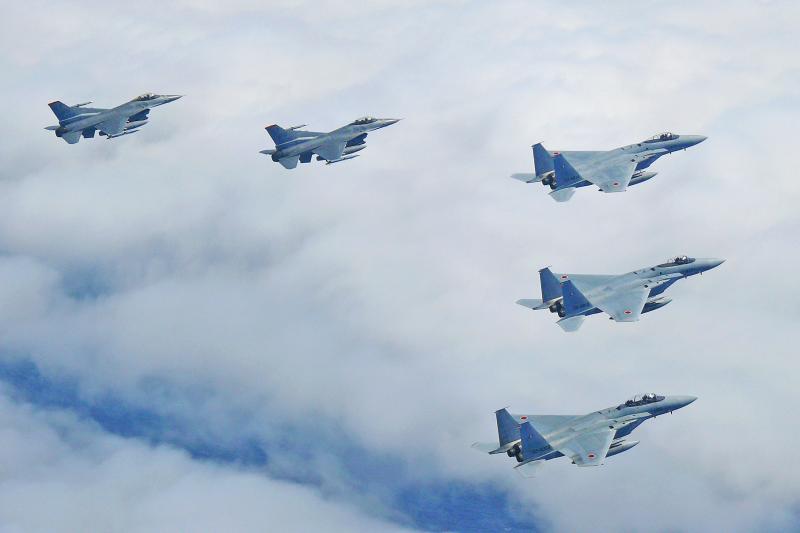A rare mention of Taiwan as a footnote in the official Japanese policy guidelines could signal further warming of Taiwan-Japan ties, as the news came on top of reports that Japan is considering dispatching Self-Defense Force officers to Taiwan.
A Japanese newspaper reported that Japan’s Cabinet yesterday ratified the Basic Policies for Economic and Fiscal Management and Reform, which includes a footnote on the importance of peace and stability in the Taiwan Strait.
The Japanese government uses the guidelines to draft economic policies and oversee fiscal management.

Photo: AP
The Japanese-language Asahi Shimbun reported that the Liberal Democratic Party Congress had been divided on whether the guidelines should include a clear statement to “deepen collaboration with Taiwan,” but later decided to reference the statement following a leaders’ summit between US President Joe Biden and then-Japanese prime minister Yoshihide Suga in April last year, as Japan has no formal diplomatic ties with Taiwan.
The congress on Monday approved adding the summit’s wording — that Japan “underscores the importance of peace and stability across the Taiwan Strait and encourages the peaceful resolution of cross-strait issues” — as a footnote in the guidelines.
Taiwan was last mentioned in a US-Japan leaders’ statement in 1969, when then-US president Richard Nixon met with then-Japanese prime minister Eisaku Sato.
Minoru Kihara, a member of the Liberal Democratic Party’s Policy Affairs Research Council, said that the mention of Taiwan in the guidelines, even as a footnote, was “very rare.”
Party members’ demand that the mention of Taiwan be moved from the footnote to the body of the guidelines would be handled by council chairwoman Sanae Takaichi, Kihara said.
In Taipei, Ministry of Foreign Affairs spokeswoman Joanne Ou (歐江安) yesterday said that Taiwan welcomes any positive measure that contributes to heightening the importance of peace and stability across the Taiwan Strait.
Taiwan would continue to collaborate and deepen relations with like-minded partners such as Japan to jointly defend the common values of democracy and freedom, Ou said.
Ou declined to comment on reports that Japan might dispatch serving Self-Defense Force officers to Taiwan.
The guidelines ratified yesterday also state that Japan would drastically increase defense spending “within the next five years.”
Neither the five-year period nor the reference to Taiwan had figured in a draft version of the document last week.
By contrast, last year’s version of the guidelines said only that Japan would significantly increase defense spending as necessary.
The document — which includes issues ranging from energy security to Japanese Prime Minister Fumio Kishida’s “new capitalism” — does not assign an amount to Japan’s commitment to “drastically strengthen” defense spending.
However, the guidelines did refer to the commitment of many NATO members to spend 2 percent of GDP on defense. Japan now spends just over 1 percent of GDP on its Self-Defense Forces.
Additional reporting by Reuters

‘SECRETS’: While saying China would not attack during his presidency, Donald Trump declined to say how Washington would respond if Beijing were to take military action US President Donald Trump said that China would not take military action against Taiwan while he is president, as the Chinese leaders “know the consequences.” Trump made the statement during an interview on CBS’ 60 Minutes program that aired on Sunday, a few days after his meeting with Chinese President Xi Jinping (習近平) in South Korea. “He [Xi] has openly said, and his people have openly said at meetings, ‘we would never do anything while President Trump is president,’ because they know the consequences,” Trump said in the interview. However, he repeatedly declined to say exactly how Washington would respond in

Japanese Prime Minister Sanae Takaichi said yesterday that China using armed force against Taiwan could constitute a "survival-threatening situation" for Japan, allowing the country to mobilize the Japanese armed forces under its security laws. Takaichi made the remarks during a parliamentary session yesterday while responding to a question about whether a "Taiwan contingency" involving a Chinese naval blockade would qualify as a "survival-threatening situation" for Japan, according to a report by Japan’s Asahi Shimbun. "If warships are used and other armed actions are involved, I believe this could constitute a survival- threatening

WARFARE: All sectors of society should recognize, unite, and collectively resist and condemn Beijing’s cross-border suppression, MAC Minister Chiu Chui-cheng said The number of Taiwanese detained because of legal affairs by Chinese authorities has tripled this year, as Beijing intensified its intimidation and division of Taiwanese by combining lawfare and cognitive warfare, the Mainland Affairs Council (MAC) said yesterday. MAC Minister Chiu Chui-cheng (邱垂正) made the statement in response to questions by Democratic Progressive Party (DPP) Legislator Puma Shen (沈柏洋) about the government’s response to counter Chinese public opinion warfare, lawfare and psychological warfare. Shen said he is also being investigated by China for promoting “Taiwanese independence.” He was referring to a report published on Tuesday last week by China’s state-run Xinhua news agency,

‘ADDITIONAL CONDITION’: Taiwan will work with like-minded countries to protect its right to participate in next year’s meeting, the foreign ministry said The US will “continue to press China for security arrangements and protocols that safeguard all participants when attending APEC meetings in China,” a US Department of State spokesperson said yesterday, after Beijing suggested that members must adhere to its “one China principle” to participate. “The United States insists on the full and equal participation of all APEC member economies — including Taiwan — consistent with APEC’s guidelines, rules and established practice, as affirmed by China in its offer to host in 2026,” the unnamed spokesperson said in response to media queries about China putting a “one China” principle condition on Taiwan’s